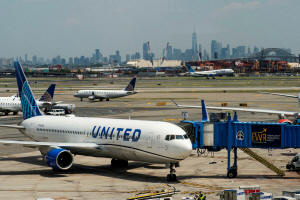|
Recent flight disruptions have raised new concerns about whether
airlines are ready to handle the summer travel boom during the
first Fourth of July holiday in which U.S. air traffic is likely
to exceed pre-COVID levels.
"While we work to control the things that are within our
control, we must also do a better job of planning against the
things that are outside our control so that we can be in a
position to recover more quickly," Kirby said in a note.
Last month, United canceled about 19% of its scheduled flights
as thunderstorms and equipment failures at a U.S. Federal
Aviation Administration (FAA) facility in Washington caused
significant delays for air travelers on the U.S. East Coast.
About 26,000 flights were delayed by all airlines during a
weekend in June after thunderstorms ripped through parts of the
U.S., according to data from flight monitoring service
FlightAware. Kirby last week blamed the FAA for recent flight
cancellations.
United Airlines is also working with Port Authority of New York
and New Jersey to get more gates, Kirby said, adding that the
company would have to further change or reduce its schedule give
itself more spare gates and buffer, particularly during storm
season.
"Airlines can plan for things like hurricanes, sub-zero
temperatures and snowstorms, but United has never seen an
extended limited operating environment like the one we saw this
past week at Newark," Kirby said in a note to employees.
(Reporting by Anirudh Saligrama in Bengaluru; Editing by David
Gregorio)
[© 2023 Thomson Reuters. All rights
reserved.] Copyright 2022 Reuters. All rights reserved. This material may not be published,
broadcast, rewritten or redistributed.
Thompson Reuters is solely responsible for this content.

|
|



